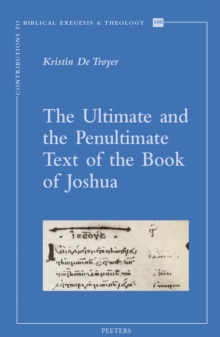
The Semantics of 'bad' in Ancient and Mishnaic Hebrew PDF
by PD Foster
Part of the Contributions to Biblical Exegesis & Theology series
Description
In this monograph, the semantics of the word (bad) is examined across the corpus of Ancient Hebrew and the Mishnah.
The study takes cognitive linguistic theories as its theoretical base and proceeds by first examining the schematic content that (bad) tends to modify (as an adjective).
It moves on to map the lexical semantic domains of (bad) and then examines (bad) with reference to some major terms within these domains.
The study concludes by presenting a thorough description of (bad) derived from the analysis.
It relates these findings to the previous studies on (bad) as well as the lexica before suggesting how a new entry on (bad) might be written.
In addition to the important findings on (bad), the study points to what is likely an important difference between ... and ... which requires further investigation.
Information
-
Download - Immediately Available
- Format:PDF
- Pages:354 pages
- Publisher:Peeters Publishers
- Publication Date:03/03/2022
- Category:
- ISBN:9789042946675
Information
-
Download - Immediately Available
- Format:PDF
- Pages:354 pages
- Publisher:Peeters Publishers
- Publication Date:03/03/2022
- Category:
- ISBN:9789042946675










